Geesi diaries: challenging stereotypes to follow a dream to serve local communities

8 March 2021 – Compassion. Service. Empathy. These are a few qualities that resonate with doctors and health workers around the world, and in Somalia. In Mogadishu, armed with these qualities, Dr Naima Abdulkarim, Public Health Emergency Officer for the World Health Organization (WHO) in Somalia, is braving several challenges to follow her dream to serve her community.
“My mother worked as a nurse, and every time I saw her help children and women in our village, I used to say, ‘Mom, I want to be like you,’” said Dr Naima, who joined WHO Somalia in May 2019.
Since then, she has been working closely with her team members, Government counterparts and other partners to prepare for and respond to health emergencies in the country.
Making a difference in the fight against COVID-19
Around a year ago, since the first case of coronavirus disease (COVID-19) was confirmed in Somalia, Dr Naima has been working at an isolation centre at the De Martino Hospital in Mogadishu. Her work includes providing support to the Federal Ministry of Health teams in conducting COVID-19 tests, contact tracing, capacity-building and case management. She is also supporting infection prevention and control efforts, collecting data and raising awareness of diseases like COVID-19 among the community.
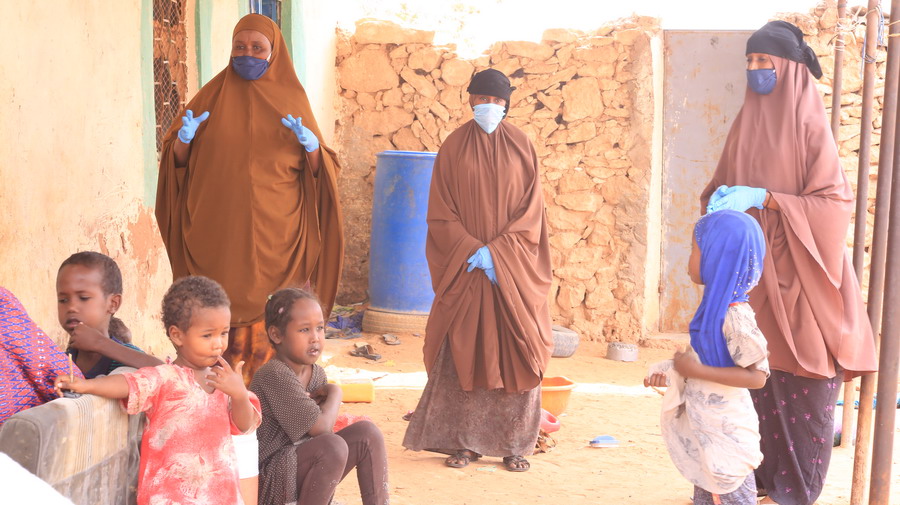
Dr Naima feels fortunate that she gets to live her dream every single day at work. One day, she explains, she received a call from one of the local community health workers supported by WHO and the Federal Government. The health worker informed her about a person – Mohamed*- who had some recent travel history, and was presenting with signs and symptoms of COVID-19 in a village.
Unfortunately, Mohamed and his family hid from the community health worker, as they didn’t believe in COVID-19 and insisted it was just a common cold.
Even though most routes to the village were closed due to security issues, Dr Naima set out to meet Mohamed. Covered with her personal protection gear, including a face mask and hand gloves, and with help from the local community, Dr Naima visited Mohamed’s family. From a safe distance, she explained to them the effects of COVID-19 and how to prevent it. She also explained how isolation could help them all from spreading the disease if it was indeed COVID-19. After a while, the family understood her message, and allowed Dr Naima to admit the patient in the isolation centre. After 3 days, Dr Naima received a call from Mohamed’s family – 2 more of their family members had similar symptoms that were not too serious. Now that they knew better, they managed to isolate themselves at home, they explained.
When she checked on them after a few days, Dr Naima was pleased to note that Mohamed and his family members had recovered well and had avoided any further spread of the disease.
Standing tall in the face of stereotypes
Dr Naima’s professional life doesn’t come without personal challenges. As she studied or discussed her ambitions, people were always trying to convince Dr Naima to change her mind about becoming a doctor.
“I have had to face a lot of questions and comments from people, like, ‘A woman will never be able to survive such a terrible emergency,’ or, ‘This is a man’s job,’” says Dr Naima, beaming as if to show she has proved them all wrong.
Her passion for humanitarian work and helping her community has kept her strong and dedicated over time.
“If there was one thing I could change about my country,” says Dr Naima, “I would change people’s belief that women cannot learn and cannot do everything, because we can. We can do anything we put our hearts into, no matter where we live.”
Protecting the vulnerable: WHO scales up emergency health operations in Bakool of South West State, Somalia
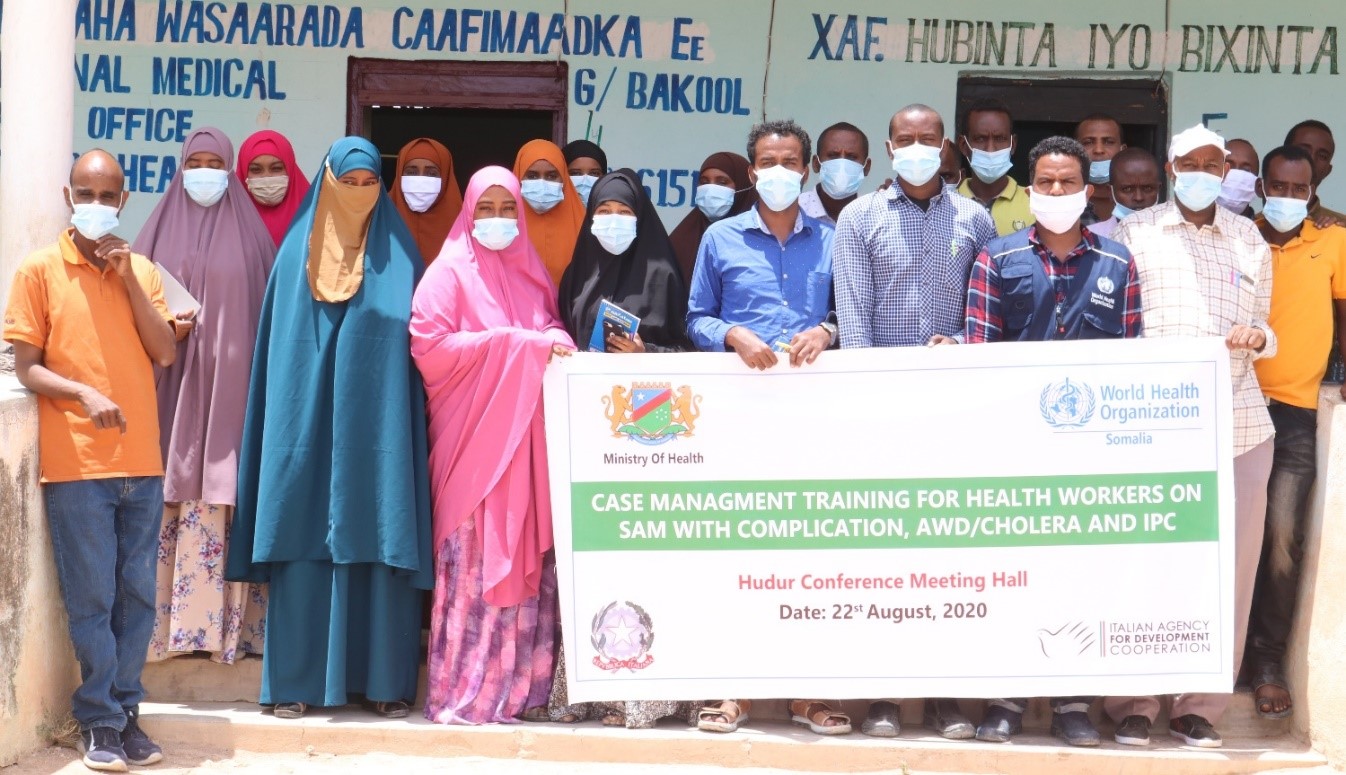 Case management training, Hudur Hospital, South West State, Somalia
Case management training, Hudur Hospital, South West State, Somalia
10 February 2020 – In 2019, a joint mission consisting of inter-cluster and inter-ministerial officials visited Hudur Hospital, located in the Bakool region of South West State – a drought-prone area, with a total population of 350 000 hosting 23 000 displaced persons. The mission identified access to emergency and trauma health care services as critical gaps, in particular for Hudur’s displaced population, which was found to be in need of immediate life-saving and integrated health and nutrition services. The mission also found that the hospital lacked: key medical equipment, including a proper operating theatre; sufficient human resources; a functional referral system linked to primary care facilities in the region; and capacity to address communicable diseases and provide adequate obstetric care. As the only referral hospital for the entire Bakool region, there is much to be done to improve this important facility.
It is against this backdrop that the WHO country office in Somalia developed 2 complementary projects, including the “Emergency health response programme for vulnerable populations of Hudur” and “Emergency interventions supporting WHO’s activities for people with physical disabilities and victims of improvised explosive devices (IEDs) in Hudur.” Together, these initiatives aim to provide lifesaving and integrated health and nutrition services to host communities and internally displaced persons (IDP), as well as support the provision of emergency obstetric and trauma care to pregnant women and other patients.
The projects also seek to support the construction of an outpatient unit, operating theatre and incinerator, as well as establish referral support for critical care, thereby creating linkages between primary and secondary health care facilities in Hudur town. To achieve this, WHO trained 30 health workers in disease outbreak detection, investigation and response, particularly through: use of the Early Warning and Response Network (EWARN) system; providing gender-sensitive emergency mental health and psychosocial services within the hospital; training health workers, youth and elders on de-stigmatization; procuring emergency medical supplies and equipment; and deploying emergency response mobile teams within Hudur and surrounding areas. WHO will also support the construction of an outpatient unit and operating theatre, hospital incinerator, installation of Solar Hybrid System as well as the development of rain water harvesting structures. Overall, the project targets 85 000 women and men in the host community and IDP camps, as well as 17 000 pregnant women and 7200 trauma patients.
The WHO expresses its sincere thanks to the Italian Agency for Development Cooperation for its generous support as part of these important projects and encourages other donors and partners to scale up support for Hudur Hospital, as the only referral hospital in the entire Bakool region.
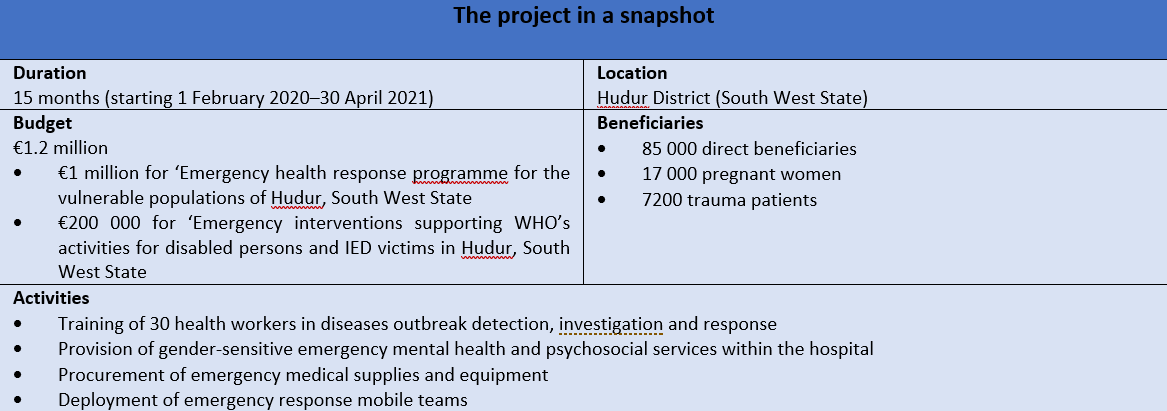
For further details, please contact:
Mr Kyle DeFreitas
External Relations Officer
EU and WHO provide additional support to prevent COVID-19 spread and strengthen health systems in Somalia
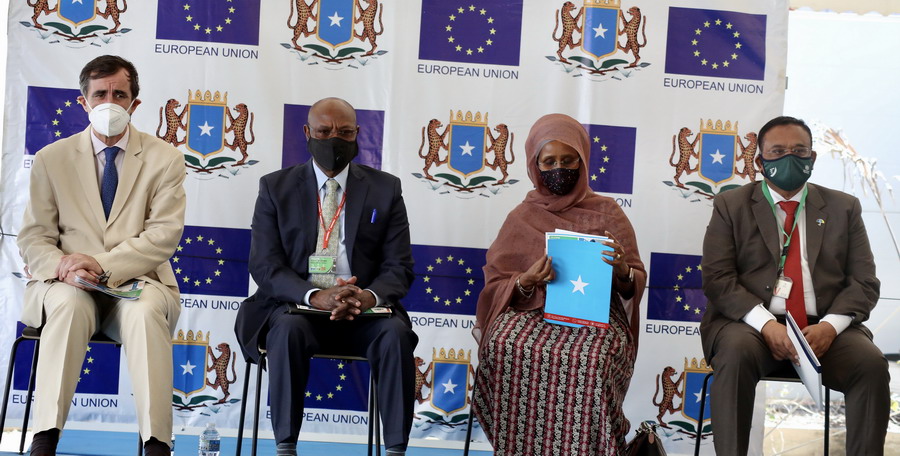
Mogadishu, 4 February 2021 – Yesterday, the European Union (EU) launched a €5 million multi-year project to support the World Health Organization (WHO) and the Federal Government of Somalia to prevent further community spread of the coronavirus disease (COVID-19) and to strengthen the health services delivery across the country as Somalia’s health systems start recovering from the aftershock of the pandemic.
“We are grateful for our collaboration with WHO which has made all involved actors work as a team in this pandemic. In the path towards a prosperous and stable Somalia, COVID-19 should be seen as an opportunity to develop better public services and make Federal and States’ institutions work together in a more coordinated way,” said Nicolás Berlanga Martínez, EU Ambassador to Somalia.
“In addition to saving lives and preventing the spread of COVID-19, this project will help us build a legacy for Somalia’s health systems,” said HE Dr Fawziya Abikar Nur, Minister of Health and Human Services, Federal Government of Somalia. “We are grateful to our partners, the EU and WHO, who are supporting us to reduce the burden and effects of deadly and communicable diseases, save lives of our community members, and make our health systems stronger and more effective.”
“We are leaving no stone unturned. Together with the EU, and the Federal Government of Somalia, we are redoubling our efforts to ensure everyone, everywhere in this country is safe and protected from COVID-19 and other health threats. Building integrated disease surveillance systems and the capacity of health care workers on disease detection and surveillance will remain key to achieving the impact of the project. Strengthening coordination and operational capacity for risk communication, delivering people-centred primary health care services will ensure access and availability of health services for marginalized and vulnerable populations. This will contribute immensely for building blocks of the health systems,” said Dr Mamunur Rahman Malik, WHO Representative in Somalia.
The project, entitled ‘Emergency operational response to COVID-19 in Somalia to support the prevention of large-scale community spread through public health systems strengthening’, aims to contain and suppress the COVID-19 epidemic, and other disease outbreaks, in locations where signs of virus circulation and transmission continue. The project, which was signed in December 2020, will contribute to preventing large-scale community transmission of COVID-19 and further spread and/or resurgence of the virus, as well as other epidemic-prone diseases, while, also, helping health systems recover better and stronger. WHO and the Federal Ministry of Health will jointly implement the project.
Over a 3-year period, the project will support institution and capacity-building of the health workforce in the country, such as establishing integrated data management and surveillance system and launching a new services availability and readiness assessment (SARA) survey, which will consolidate information on all health facilities and services available across the country. This information will be useful to better understand how the project is having an impact on its beneficiaries by improving health and keeping them safe and protected.
A complementary EU-funded project for UN-Habitat, which aims at supporting preparedness, response and mitigation activities for reducing the negative impacts of COVID-19 on health, public hygiene and livelihoods was also launched at this event.
Note to editors
This new and vital multi-year partnership stems from a Bilateral Technical Coordination Mechanism previously established between WHO Somalia and the EU Delegation to Somalia, which sought to strengthen operational response capacities for COVID-19 and other health emergencies. Additionally, US$ 1.9 million was provided by the European Civil Protection and Humanitarian Aid Operations (ECHO) to WHO in January 2020, in support of WHO’s COVID-19 preparedness and response operations in Somalia.
Related links
EU and WHO Somalia sign multi-year agreement to combat COVID-19 and strengthen health systems
WHO and EU unite to fight COVID-19 in Somalia
EU and WHO unite to deliver critical life-saving supplies to flood-affected areas in Somalia
European Union and WHO Somalia deliver more emergency hospital supplies
EU and WHO deliver emergency life-saving supplies to flood-affected areas in Somalia
For further information, please contact:
Mr Kyle DeFreitas
External Relations & Resource Mobilization Officer
WHO Somalia
Mob: +254-782-501-324
Email:
Ms Fouzia Bano
Communications Officer
WHO Somalia
Mob: +252-619-235-880
Email:
Mr Vicente Sellés
Programme Manager/Liaison Officer
Delegation of the European Union to the Federal Republic of Somalia
Mob: +252-619-505-392
Email:
An innovative and unique partnership: WHO, Sweden and Somalia work together to improve health outcomes for all Somalis
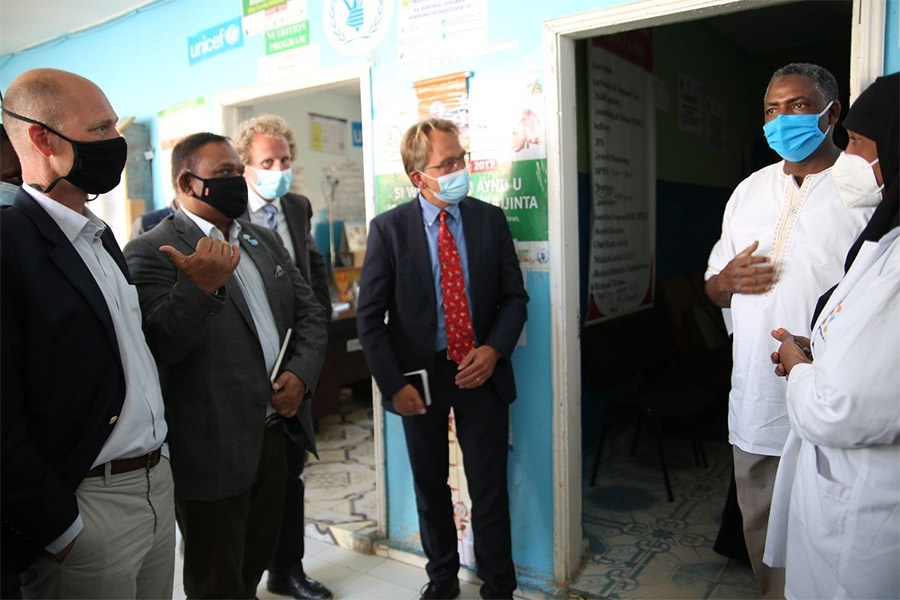 Swedish Ambassador, UNFPA, UNICEF and WHO joint UHC High-Level mission to Hargeisa and Garowe
Swedish Ambassador, UNFPA, UNICEF and WHO joint UHC High-Level mission to Hargeisa and Garowe
1 February 2021 - Nearly 30 years of conflict and instability have heavily marked Somalia’s recent history. Some gains are being made, but the country still faces many challenges ahead.
Somalia’s health indicators, especially for women and children rank among the lowest in the world.
Recently published statistics show that maternal mortality and deaths of children under five remain high, while female genital mutilation is still widespread. Prevalence of early marriage also contributes to high fertility rates. These issues are further exacerbated by cramped conditions in the country’s over 2 000 sites for internally displaced persons.
An innovative partnership between WHO, Sweden and Somalia’s Ministry for Health was launched to address these and other persistent health problems. The partnership, which is borne out of a policy dialogue and a high-level mission by Sweden to Somalia in 2020, aims to create an independent Somali Public Health authority and to modernize the country’s health information management system.
This collaboration between Sweden and WHO in Somalia was inspired by WHO’s 2019-2013 General Programme of Work to deliver impact at the country level.


